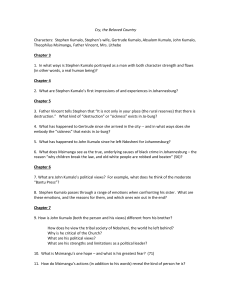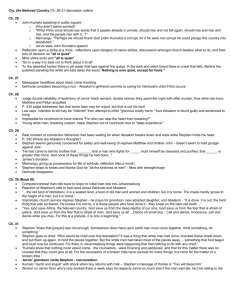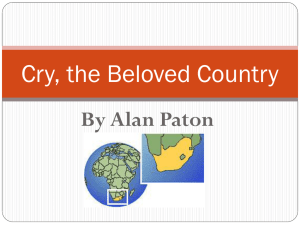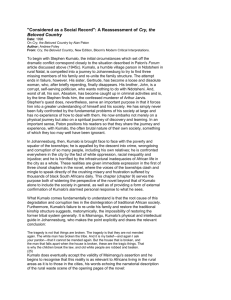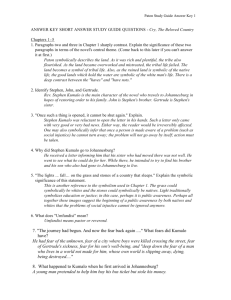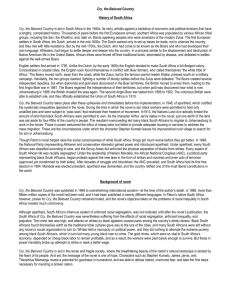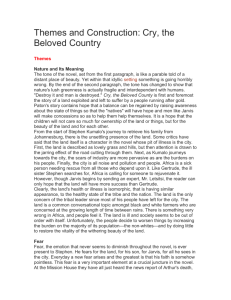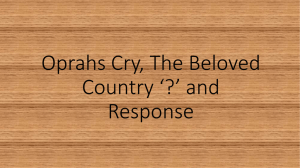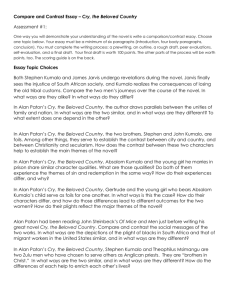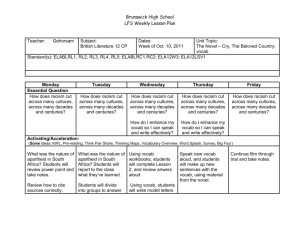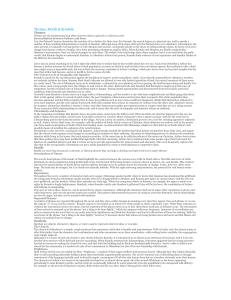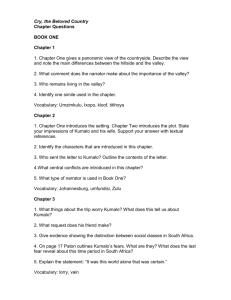Cry the Beloved Country
advertisement
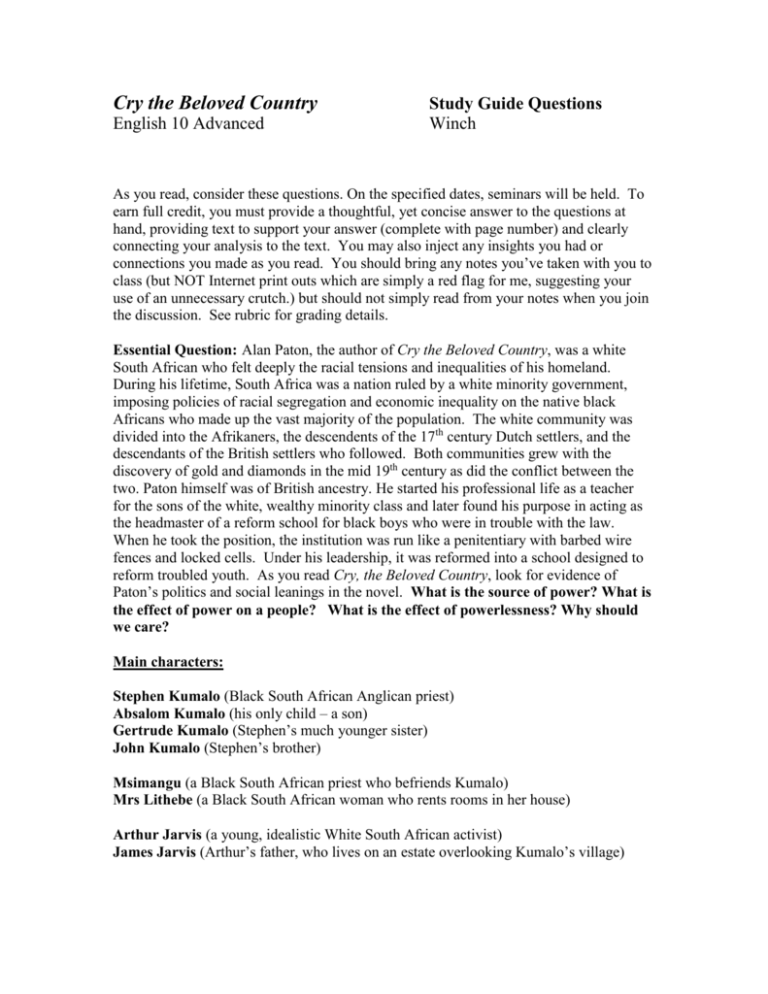
Cry the Beloved Country English 10 Advanced Study Guide Questions Winch As you read, consider these questions. On the specified dates, seminars will be held. To earn full credit, you must provide a thoughtful, yet concise answer to the questions at hand, providing text to support your answer (complete with page number) and clearly connecting your analysis to the text. You may also inject any insights you had or connections you made as you read. You should bring any notes you’ve taken with you to class (but NOT Internet print outs which are simply a red flag for me, suggesting your use of an unnecessary crutch.) but should not simply read from your notes when you join the discussion. See rubric for grading details. Essential Question: Alan Paton, the author of Cry the Beloved Country, was a white South African who felt deeply the racial tensions and inequalities of his homeland. During his lifetime, South Africa was a nation ruled by a white minority government, imposing policies of racial segregation and economic inequality on the native black Africans who made up the vast majority of the population. The white community was divided into the Afrikaners, the descendents of the 17th century Dutch settlers, and the descendants of the British settlers who followed. Both communities grew with the discovery of gold and diamonds in the mid 19th century as did the conflict between the two. Paton himself was of British ancestry. He started his professional life as a teacher for the sons of the white, wealthy minority class and later found his purpose in acting as the headmaster of a reform school for black boys who were in trouble with the law. When he took the position, the institution was run like a penitentiary with barbed wire fences and locked cells. Under his leadership, it was reformed into a school designed to reform troubled youth. As you read Cry, the Beloved Country, look for evidence of Paton’s politics and social leanings in the novel. What is the source of power? What is the effect of power on a people? What is the effect of powerlessness? Why should we care? Main characters: Stephen Kumalo (Black South African Anglican priest) Absalom Kumalo (his only child – a son) Gertrude Kumalo (Stephen’s much younger sister) John Kumalo (Stephen’s brother) Msimangu (a Black South African priest who befriends Kumalo) Mrs Lithebe (a Black South African woman who rents rooms in her house) Arthur Jarvis (a young, idealistic White South African activist) James Jarvis (Arthur’s father, who lives on an estate overlooking Kumalo’s village) Book I Due date: Thursday, Nov. 4th Opening Question: To what extent are we all products of our environments? What circumstances can alter our perspectives? Is this alteration beneficial or detrimental? Core Questions: 1. Why does Kumalo feel he should/must go to Johannesburg? Who summons him? How/Why? Is that significant? How does he react to this summons and why? 2. How is the Kumalos’ financial situation made obvious? What is the significance of this? 3. What dangers/uncertainties/unfamiliar situations does Kumalo encounter on his journey and in the city? What does that tell the reader about him? What is the author’s purpose here? 4. Summarize and analyze the conversation Kumalo and the other priests have the night he arrives in Johannesburg. What is the author’s purpose in including this dialogue? 5. What does Kumalo learn about his sister, brother and son? What is his reaction to each? What aspect of South African society does each represent? 6. How do Gertrude, John and Absalom’s attitudes differ? Why? 7. Why was Absalom let out of the reformatory? By whom? What does this tell us about the societal structure of S.A. and reform? 8. Describe Msimangu as a character. What is his position in the novel? What does he say that resonates with you? 9. How are the worlds of white South Africa and the world of Black South Africa contrasted? Is it one world or two? 10. What kindnesses does Kumalo encounter in Johannesburg? How is he changed by his journey? Book II Due date: Wednesday, Nov. 10th Opening Question: Core Questions: 1. How does James Jarvis first hear of his son’s death? What insight does the scene/setting offer the reader about the Jarvis family’s social and economic standing in South Africa? What insight does his reaction to the news offer the reader about him as a person and father? 2. Summarize Arthur’s writings. According to him, what was permissible and what is not permissible? What is his analysis of their “Christian civilization”? According to his writings? Why is he doing what he is doing? Where is the irony? 3. How is Arthur’s funeral both representative of South Africa’s social and economic inequalities AND hopeful for a new South Africa? How does the funeral impact James Jarvis? What does he realize? How do Arthur’s writings impact him? 4. Who is “Harrison”? What is your impression of him and why? Do you get the impression that the author agrees or disagrees with him? What gives you this impression? What does he represent? 5. What is the tone of chapter 23? What is the PURPOSE of chapter 23? 6. What insight does the reader get into Absalom’s personality from the first encounter with the judge? From his interaction with his own father? From the trial itself? Describe his affect. 7. Describe the meetings between Stephen Kumalo and Absalom in Johannesburg. How are they painful and why? To whom? How do you account for each man’s reaction to the other? Where is the irony? Is there any hope offered? 8. How and why is the first meeting between Stephen Kumalo and James Jarvis especially poignant? What does it tell us about each man? 9. How is Stephen betrayed by his brother John? What does this tell us about John’s character? How does Stephen react and what does this tell us about him? 10. What finally happens with Gertrude? Why? What might the author be saying? 11. How has Stephen Kumalo changed as he leaves Johannesburg? Find evidence of his thought processes as he absorbs this horror. 12. Analyze Msimangu’s position in this tragedy. What does he represent (intellectually, emotionally and spiritually) and how? Book III Due Date: Thursday, Nov. 18th Opening Question: Core Questions: What is the source of hope in tragedy? What keeps us moving forward when our hearts are breaking? 1. Describe Kumalo’s wife’s reaction to the news he brings when he arrives home. What does this tell us about her? 2. Describe the villagers’ reactions to Kumalo’s return. What does this tell us about the village? Compare/contrast that with Johannesburg. What might the author be saying? 3. How does Kumalo feel upon his return to the village and how do we know that? 4. What lesson do the villagers teach Kumalo? How do we know that he’s learned this lesson? 5. What lesson does Jarvis teach Kumalo? How does their relationship evolve? 6. How has Kumalo changed as a result of his time in Johannesburg? What does he do which he might not have done before? 7. Give examples of hope for the future, which are introduced in Book III. Analyze the type of hope each offers. 8. How is the last scene in the novel Biblical in nature? (Of what Bible story/stories does it remind one?) What is Alan Paton’s message?
